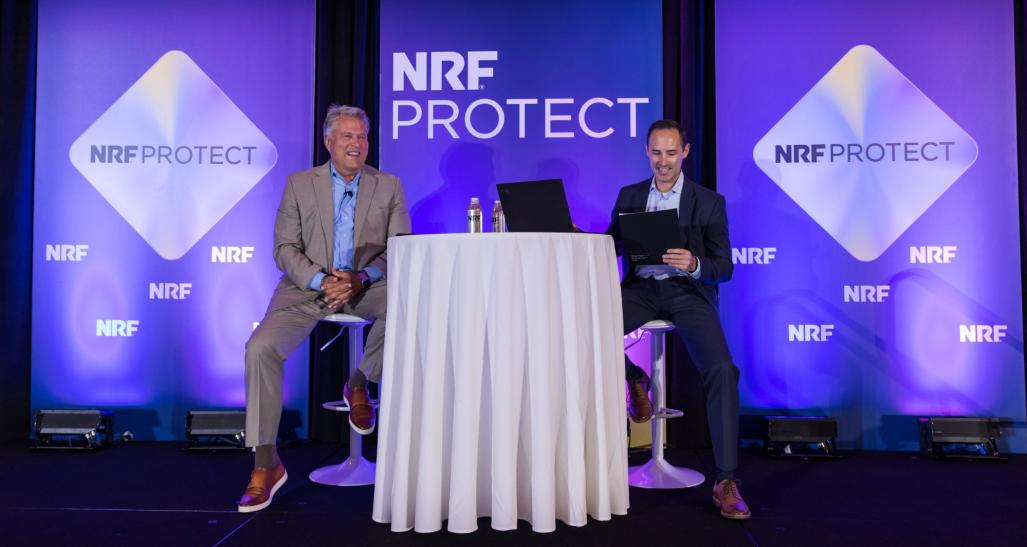
From left: Rob Holm of McDonald’s speaking with Bryan Niederhelm of Gavin de Becker & Associates at NRF PROTECT 2023.
With more than 300 mass shootings in the United States so far in 2023, the urgency to address issues of violence and learn how to prevent it is clear. At NRF PROTECT, McDonald’s Director of Global Security Rob Holm and Bryan Niederhelm, senior vice president for threat assessment and management with Gavin de Becker & Associates, shared strategies for intervention and prevention.
Check out the recap and learn more about NRF PROTECT 2023, covering insights and strategies on loss prevention, asset protection, digital fraud and cybersecurity.
To illustrate the importance of strategies that head off violence at its origins, Niederhelm used an example of his 16-year-old daughter, who was about to get a driver’s license and to whom he had provided some conventional “defensive driving” training. He then referenced a strategy Holm used with his now-adult sons, for which Holm had established a “safe driving” contract they had to sign and commit to. The contract conveyed the gravity of the responsibility to drive; expectations regarding grades, no drinking and driving; and the consequences if the contract was violated.
By a show of hands, only one other person in the room had ever used a similar strategy. That made a point regarding the way creative and early strategies symbolize how we must begin thinking about the prevention of violence.
“That’s where true prevention happens,” he said. “We need to think about it in advance, and we need to think differently. It’s our responsibility to identify internal predictors of violence before it happens. If violence is a river, how can we get further upstream?”
One way to get further upstream, both presenters agreed, is to invest more energy into who and how we’re hiring people. “The workplace is a dish and we control the ingredients,” Niederhelm said. “We know the recipe for violence. We need to remove ingredients that encourage violence and add the ones that reduce it.”
“We know the recipe for violence. We need to remove ingredients that encourage violence and add the ones that reduce it.”
Bryan Niederhelm, Gavin de Becker & Associates
Language is one thing that can influence behavior, he said, describing a recent experience he’d had at Chick-fil-A, the third-largest fast-food restaurant as measured by sales volume. Team members finalize each interaction by saying, with a smile, “My pleasure.” Niederhelm noted that this alone — restated hundreds of times a day by each Chick-fil-A employee — inspires them to think about and treat customers in a manner that guides behavior in a positive way.
There is a dark side to the language people use to tell us about themselves. Suffering precedes violence, Niederhelm said, showing as an example of a man’s forearm with a graphic tattoo depicting a disturbing scene. That provides insight into the language that person spoke to himself and likely to others in the lead-up to getting his body branded with that tattoo. With a nod to Maya Angelou, he said, “When someone tells you who they are, listen to them the first time.”
To do that on the employee side, Niederhelm suggested getting creative about observing their character. “‘Tell me about somebody who helped you. Tell me about your best boss, and your worst boss. Do you consider yourself to be a happy and/or lucky person?’” Recruiters can be trained to do this, and to listen to the language spoken by applicants. “We want recruiters to be our earliest protectors,” he said.
Niederhelm offered three takeaways from the session. One, get further upstream. Two, control the ingredients in the workplace recipe. And three, bring it back to basics: care, compassion and hope. Above all, be aware of all these issues and focus on doing it better and earlier. “If we keep doing what we’ve done,” he said, “we’ll keep seeing what we see on the news.”


